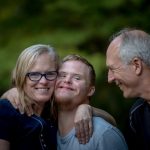They are not in the office during meetings. We don’t necessarily include them from day one. Whether we realize it or not, they impact significantly success or failure as we support a person’s employment integration. In many ways, the family always affects us by their presence or absence. Moreover, a family can be a place for people who face challenges on the road to employment to meet their needs and quest for autonomy.
Family as a source of strength
When we talk about a family’s role in “raising kids,” we mean “lifting them higher” so they reach their full potential. We know a family plays a significant role in a disabled member’s life. A family’s involvement and support quality is a real asset to a person experiencing difficulties and can become a determining factor in a person’s future socio-professional integration. However, involvement is a difficult art to master: we must know how to provide essential support to facilitate learning, and at the same time, encourage independence. We will sometimes need to take charge in certain situations, but also let people try for themselves. In short, the challenge is providing just the right amount of input, but not too much!
Fortunately, many families know how to give the right amount of support and freedom to their loved ones who have a disability and become considerable allies in the person’s employment integration. In short, a family can become involved in the process leading to a job and maintaining it; for example, by networking to find an inclusive workplace or by accompanying the person to work until the route is learned.
Other than that, a family’s contribution is not always noticed, because their most valuable contribution is done behind the scenes every day. Thus, a family supports, encourages and pushes a family member to develop their maximum potential. A family lets the member experiment and suffer some setbacks in order to eventually learn how to live well and make their mark. Families know how to reach out and get support from outside sources as well. A family provides an environment where a person’s trust and self-esteem are nurtured, a key factor to a person’s socio-professional integration.
When family stands in the way
Environmental factors are part of the disability development process. Families can help overcome some employment integration barriers as well as have the power, in a worst-case scenario, to reinforce existing or perceived barriers. Often, it’s not a case of bad faith. Unfortunately, families can also be an obstacle to a person’s integration. Some families are too involved, enabling a person and not letting them learn. Sometimes, families are totally absent or disengaged. Also, for a variety of reasons, they may disagree with the person’s desire to work. They may be afraid of changes to family dynamics and may not want to lose some of the secondary benefits of maintaining the status quo.
In some situations, families may even exacerbate the difficulties the person experiences when they live in a dysfunctional environment with a negative emotional context. As stakeholders, we meet people whose life stories can affect us, especially when we know they could have reached their full potential under better conditions.
The jobseeker who comes to your office with low self-esteem and low self-confidence is at crossroads. A job search can be synonymous with an opportunity to grow as an individual and start a new life – much more than just doing a task well and fitting into a new worker role. Self-esteem and self-confidence are often developed through work. A job helps you discover strengths you are unaware of, as well as develop a new social network and become financially independent. Under good employment conditions, work can lead to a feeling of recognition, self-fulfillment and knowing one’s place in society. And for some, work even becomes a second family.
Tell me about your family
Whether you consciously consider a person’s family or not, the impact a family has on an employment integration journey will always be present, for better or for worse. How do you get a better idea of a person’s support system? Do you work occasionally with the family to help a person achieve their goals? What happens when a family turns out to be a barrier to employment? There are many questions that deserve attention and whose answers will vary according to your support style, the organizational environment in which you work and especially the particularities of each person you help … and of course, their family!




